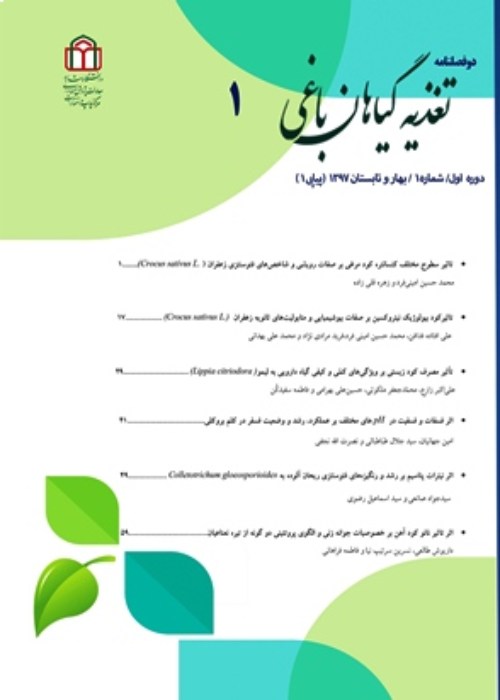Effects of foliar application of fulvic acid and zinc oxide nanoparticle on some growth parameters and essential oils of lemon basil (Melissa officinalis L.)
Lemon balm (Melissa officinalis L.) of the family Lamiaceae is an aromatic perennial subshrub native to the eastern Mediterranean region and western Asia. Lemon balm is one of important medicinal crops in Iran. There are three subspecies of Melissa officinalis subsp. officinalis, subsp. inodona and subsp. altissima; however, only subsp. officinalis has a commercial value with characteristic lemony odor, which makes it favorite for cultivation in Iran. It has long been used for its soothing medicinal effects and herbal aromatic properties (Sari and Ceylan 2002) in folk therapy. Humic acid can be classified as humin, humic acid, and fulvic acid depending on its solubility at different pH. There are many complex compounds in the fulvic acid fraction; thus, the exact chemical structure is not well known. Zinc has been considered as an essential micronutrient for metabolic activities in plants. It regulates the various enzyme activities and required in biochemical reactions leading to formations of chlorophyll and carbohydrates (Auld et al., 2001). Zinc Nano-particle is used in various agricultural experiments to understand its effect on growth, germination, and various other properties. Nano-particles with smaller particle size and large surface area are expected to be the ideal material for use as Zn fertilizer in plants. Application of micronutrient in the form of Nanoparticles (NPs) is an important route to release required nutrients gradually and in a controlled way, which is essential to mitigate the problems of soil pollution caused by the excess use of chemical fertilizers. Researchers have reported the essentiality and role of zinc for plant growth and yield (Laware, and Raskar et al., 2014) Nano scale titanium dioxide (TiO2) was reported to promote growth and essential oil compounds in Dracocephalum moldavica (Gohari et al., 2020). In the present study the experiments were carried out to understand the effect of zinc oxide nanoparticle (ZnO NPs) and fulvic acid foliar application on Melissa officinalis L. growth and essential oil content.
The experiment was conducted in the greenhouse at Varzeghan, East Azarbayjan province, Iran (longitude 46°43' E, latitude 38°42' N, altitude 1115 m). The study was done as factorial experiment using a completely randomized design (CRD) in three replications. Lemon balm (Melissa officinalis L.) seedling were purchased from Zarrin Giah Company (Urmia, Iran). Tree plants were transplanted into each 5-kg pot containing soil. Then, planted pots irrigated with water every week. The foliar application treatments including fulvic acid (0, 10 and 25 mg/L) and ZnO NPs (0, 20 and 40 mg/L) were applied four weeks after transplanting into the pots. Control plants were irrigated with water until harvest at the same manner and treated water. All measurements (morphological parameters, SPAD, leaf area, P and K concentrations, total phenolic contentment and antioxidant capacity, essential oil content) were performed at the harvest stage. Three technical replications were set for each measurement of the parameters.
The results demonstrated that foliar application of fulvic acid and ZnO NPs could improve agronomic traits, SPAD, leaf area, P and K concentrations, total phenolic contentment and antioxidant capacity, essential oil content. These positive effects were more considerable at its moderate dose (10 mg/L and 20 mg/L fulvic acid and ZnO NPs, respectively) introducing it as the best treatment to enhancement of lemon balm performance especially its essential oil content. Gohari et al (2020) reported that application of TiO2 enhanced plant performance under salinity stress. Given that fulvic acid and ZnO NPs, individually, have promising effects on different plants processes, the idea of their combination in same time caused to its treated for doubled positive effects. To be brief, the positive response of lemon balm to fulvic acid and ZnO NPs introduces organic and nanoparticle application as a supportive approach in plant production. This positive effect is more considerable by given attention to plant essential oil with importance in the cosmetic and pharmaceutical industries.
- حق عضویت دریافتی صرف حمایت از نشریات عضو و نگهداری، تکمیل و توسعه مگیران میشود.
- پرداخت حق اشتراک و دانلود مقالات اجازه بازنشر آن در سایر رسانههای چاپی و دیجیتال را به کاربر نمیدهد.



